
The solar industry is evolving rapidly, presenting opportunities and challenges for installers. , Solar Insure has collaborated with hundreds of solar contractors across the United States, gaining invaluable insights into the financial challenges and operational risks that solar companies face.
This depth of knowledge enables Solar Insure to provide solar contractors with industry-leading solutions that protect their financial health while ensuring customer satisfaction and system reliability.
In this article, we will examine the best practices that leading solar contractors have implemented to excel in this competitive market; highlighting strategies such as vertical integration, customer ownership models, service excellence, effective project management, and financial preparedness through warranty reserves.
Solar installers who adopt these approaches can significantly enhance their operational efficiency, customer satisfaction, profitability, and long-term stability.
Table of Contents
The Solar Industry Landscape
The solar industry is evolving, and while growth continues at an impressive pace, significant hurdles remain. Beyond the qualitative challenges, there is substantial quantitative data highlighting consumer hesitation. Recent surveys show that:
- 9% of consumers feel they don’t have enough information about how solar works
- 20% of consumers have encountered aggressive sales tactics
- 44% of consumers find it difficult to determine which solar companies are trustworthy
These statistics reveal a broader issue: customers often feel deceived when they don’t have the right expectations set from the beginning. Once trust is broken, it is extremely difficult to regain—not just with that particular customer but also with potential future clients. This erosion of trust ultimately impacts the reputation and success of solar businesses as a whole. Therefore, it is more important than ever to focus on improving consumer protection and setting clear, honest expectations from the start.
We must first acknowledge and accept that we are operating in a landscape that is still maturing. Solar energy, though growing rapidly, is still in the process of becoming a mainstream option for the average consumer. This means that when one solar company makes headlines for poor practices, it negatively affects the entire industry, shaking consumer confidence across the board.
Federal agencies like the Consumer Financial Protection Bureau (CFPB) and the Federal Trade Commission (FTC) have taken notice of these challenges, actively educating consumers about the risks of deceptive sales practices in the solar market.
They are issuing warnings about misleading advertisements, exaggerated savings claims, and unclear financing terms. These federal initiatives are backed by a growing push from states, advocacy groups, and consumers themselves, all of whom are demanding more protection, transparency, and accountability from the industry.
Consumers today are more informed than ever, and many come into discussions with concerns about what happens if their system doesn’t perform as expected. More importantly, they worry about the long-term support—what happens if the solar installer isn’t around in 5 or 10 years to help them?
These concerns are valid, and addressing them through clear communication, transparent practices, and customer-focused service is critical to building trust and driving the industry forward.
When discussing consumer protection with Chris Markowski, Solar Insure’s Account Executive with over 10-years in the solar industry, he shared, “In this evolving landscape, solar companies must prioritize consumer protection to maintain trust and ensure the industry’s longevity. The focus should be on selling systems and educating customers about the technology, ensuring transparency in pricing and financing, and delivering on promises long after the installation is complete. By doing so, solar companies can differentiate themselves in a crowded market and contribute to the positive growth and reputation of the industry as a whole.”
The Rise in Installer Bankruptcies
In recent years, the number of solar installer bankruptcies has increased dramatically. At Solar Insure, we have been tracking this troubling trend, which has been driven by several key factors, including supply chain disruptions, federal interest rate hikes, more restrictive project financing measures, and changes to utility Net Energy Metering (NEM) programs.
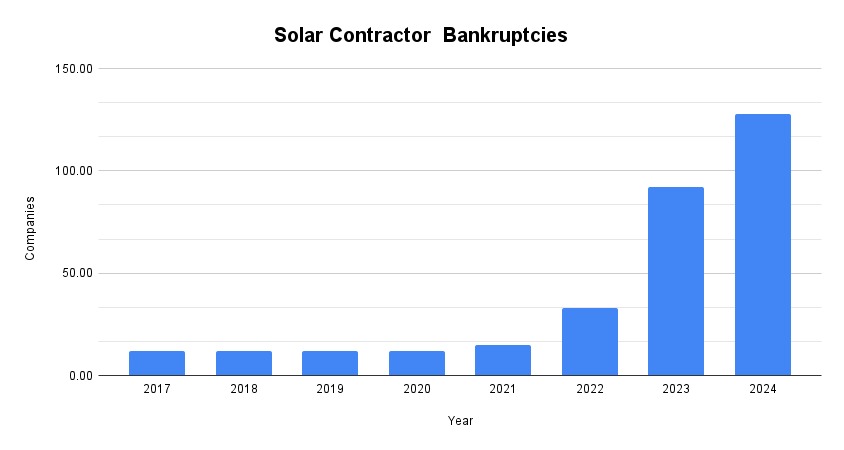
Each time an installer goes bankrupt, hundreds, thousands, or even hundreds of thousands of homeowners are left without support or guidance for their solar systems. These customers, who once relied on their installer for system maintenance, repairs, or warranty claims, suddenly find themselves in a precarious position.
“We refer to these customers as “orphaned” homeowners, and the systems they own as “abandoned” systems. These monikers imply neglect—a lack of guidance, care, and supervision. The term “orphaned” underscores the unfortunate reality that these homeowners, who made a significant investment in solar, are left to navigate system issues on their own. Without proper support, their solar investment is at risk, and the confidence of potential future customers is further eroded” says Chris
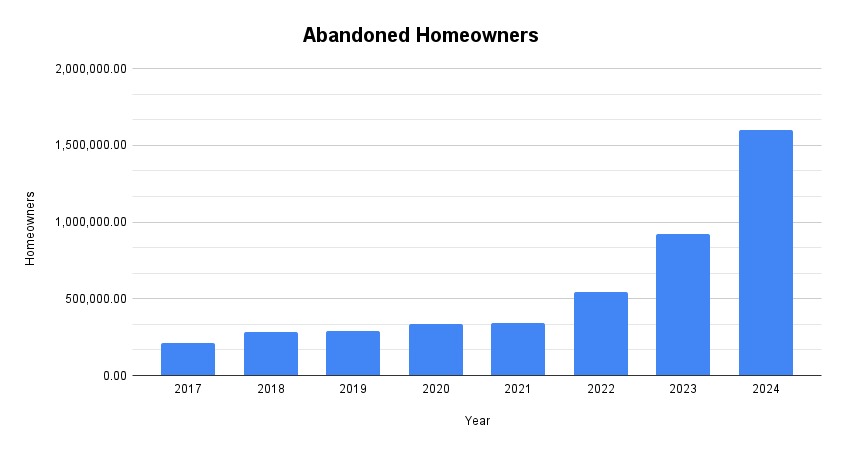
This growing wave of abandoned systems presents a significant challenge for the industry as a whole. When installers fail, the trust in solar as a reliable energy source is compromised, not just for those directly impacted but for all potential consumers. It becomes increasingly important for solar companies to plan for long-term customer care and support, ensuring that systems are maintained even if an installer ceases to operate.
What Defines a High-Performing Solar Company
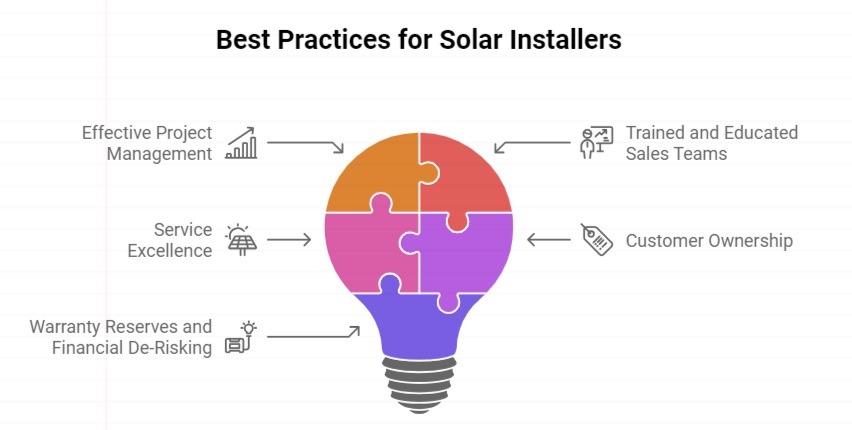
A high-performing solar company consistently excels across several key areas that ensure long-term success and customer satisfaction. These companies balance operational efficiency, customer focus, financial health, and sustainable growth. The defining characteristics of high-performing solar installers include:
- Experienced and Well-Trained Sales Teams: High-performing solar companies have well-trained and knowledgeable sales teams. These sales representatives are thoroughly educated on solar technology, financing options, and customer needs. This ensures honest, transparent communication and fosters long-term relationships.
- Operational Excellence: High-performing companies streamline their processes with effective project management and specialized teams. They adopt technologies such as project management and automation software. They focus on delivering quality installations efficiently and safely, reducing delays and errors.
- Customer-Centric Focus: These companies prioritize the customer experience by setting clear expectations, offering transparent communication, and verifying promises through methods such as point-of-sale “welcome calls.”
- Long-Term Service and Warranty Support: High-performing solar companies are proactive in managing service requests and warranty claims, using tools like Solar Insure to monitor systems and ensure timely service.
- Financial Stability and Risk Management: These companies are financially sound, with well-managed warranty reserves, de-risking strategies, and adaptability to challenges like supply chain disruptions and changes in project financing. Their financial stability builds trust with both customers and investors.
By excelling in these areas, including maintaining a well-trained sales team, high-performing solar companies not only deliver better results for their customers but also position themselves for ongoing success in a competitive and evolving market.
In the following sections, we will examine each of these critical elements in detail to explore how they contribute to long-term success.
Trained and Educated Sales Teams
Both in-house and outsourced sales teams have a place in the solar industry. While in-house sales teams generally offer more control over messaging and customer experience, outsourced sales teams can provide scalability and reach.
The key to success in either model is ensuring that sales representatives are well-trained and educated, with a clear understanding of the industry’s technical aspects and consumer protection standards. Proper training enables sales teams to present accurate information, build customer trust, and align with the company’s long-term service goals.
The Importance of Training for Sales Teams
Whether sales teams are in-house or outsourced, well-structured training is critical. Properly trained sales representatives are more likely to convey accurate, transparent information and maintain consistency in sales messaging. This minimizes the risk of overpromising and ensures customers receive the right solutions based on their needs, which, in turn, helps protect the company’s reputation.
While in-house teams may offer greater consistency and alignment with company goals, outsourced sales teams can also succeed when given the appropriate training and support. By educating both internal and external teams on essential aspects of solar technology, financing options, and customer care, companies can ensure a high-quality customer experience across the board.
SEIA 401 Standards for Consumer Protection
The Solar Energy Industries Association (SEIA), the largest solar industry trade group, has developed SEIA 401 Standards, which are designed to promote consumer protection and elevate sales practices across the industry.
These standards were established based on contributions from industry leaders and seek to set guidelines that ensure sales representatives are well-versed in key areas of the solar industry.
SEIA 401 Standards focus on:
- Defining industry terms and abbreviations to create consistency in communication between sales teams and consumers.
- Identifying the content and frequency of training for sales reps on key topics, including photovoltaic (PV) systems, energy storage systems (ESSs), electric vehicle (EV) charging, tax credits, incentives, and utility programs.
- Establishing a common language for ownership models, financing, and third-party ownership (TPO) contracts to ensure that consumers fully understand their options.
- Promoting honest and transparent claims about the benefits of solar, energy storage, and EV charging, helping to align sales messaging with realistic outcomes.
By adhering to SEIA 401 Standards, companies can ensure that their sales teams—whether in-house or outsourced—are equipped with the knowledge to engage with customers professionally and transparently. This creates a more consistent sales process across the industry and helps protect customers from misinformation.
ReCheck: Industry Self-Regulation for Sales and Installer Certifications
ReCheck was launched in partnership with SEIA and other leading companies to strengthen consumer protection and sales accountability. It is the solar industry’s largest self-regulation effort to date, providing a platform for verifying the certifications and licenses of installers and salespeople.
About ReCheck:
- Voluntary for now, but potentially required in the future: Currently, ReCheck is a voluntary program. However, in the future, lenders may require sales reps to be registered with ReCheck in order to submit deals, increasing the likelihood of widespread adoption.
- Verification of credentials: ReCheck is not a licensing body but acts as a verification system, ensuring that participants—whether companies or individuals—hold the necessary certifications, licenses, and credentials. This helps companies prove their legitimacy and salespeople verify their qualifications.
- Public registry: The platform offers a searchable public registry, where customers can look up businesses and sales reps, ensuring they are working with qualified professionals.
- Simple registration: Registration for sales reps takes just a couple of minutes, and installers can create business profiles to list and verify their associated sales reps.
“ReCheck provides an additional layer of transparency for consumers, allowing [consumers] to ask any sales rep knocking on their door to prove their qualifications through their ReCheck profile. This initiative has already gained traction, with salespeople showing their ReCheck IDs to prospective customers, furthering the goal of industry-wide consumer protection,” shares Chris
Balancing In-House and Dealer Sales Teams
While in-house sales teams typically offer more control over messaging and the customer experience, there is still a place for well-managed dealer programs. Certain highly organized EPCs (Engineering, Procurement, and Construction companies) achieve high-quality sales performance by maintaining strict onboarding, training, and vetting processes for their dealers.
These companies implement standardized training and uphold specific standards to ensure that the dealers they work with provide consistent, accurate messaging to customers.
Additionally, some EPCs establish mutually protective partnership agreements with dealers that may or may not require exclusivity. These agreements set clear expectations around customer care, sales messaging, and pricing, ensuring that dealers act in alignment with the company’s long-term goals. When properly trained and supported, dealers can be an effective extension of a company’s sales efforts without compromising quality.
Customer Ownership
High-performing solar installers increasingly focus on selling systems that customers own outright, whether through cash purchases or financing options.
Unlike third-party ownership (TPO) models—where companies lease the system to customers or use power purchase agreements (PPAs)—customer ownership establishes a direct, long-term relationship between the installer and the homeowner.
This approach not only simplifies the financial structure but also eliminates many of the operational challenges associated with TPO models.
Advantages of Selling Ownership for Solar Installers
One of the largest benefits of promoting customer ownership over TPO is the ability to get paid promptly for installation and service work. In a customer-owned model, the installer maintains full control over service and repairs, leading to faster payments for completed work, especially when using Solar Insure to help manage service work.
In contrast, under TPO agreements, installers often face significant delays in receiving payments for their work, particularly when dealing with large third-party companies like SunPower or Sunnova.
Many SunPower dealers, for example, have reported not being paid at all due to SunPower’s bankruptcy, which left a trail of unpaid bills for completed work. Similarly, numerous Sunnova dealers have experienced delays of 4-6 months or longer in receiving payments for installation and service work.
These payment delays can cause serious cash flow issues for installers and create operational challenges as they continue to carry the financial burden of maintaining systems they do not own. The administrative complexity of TPO models, combined with the delayed payment cycles, adds additional risk for installers.
Benefits of Customer Ownership
The direct relationship between the homeowner and the installer offers multiple benefits for the installer, particularly in the form of repeat business, referral opportunities, and future system upgrades. When homeowners own their systems, they are more likely to seek ongoing services from the installer, whether it’s for routine maintenance, system monitoring, or future expansions.
As battery storage becomes more affordable and essential for maximizing solar benefits, homeowners who own their systems are better positioned to retrofit their existing systems with batteries. In contrast, PPA or lease agreements may lock the system at its current size and configuration due to contract terms between the system owner (the third-party provider) and the homeowner. This limits flexibility for adding storage or expanding the system in the future.
Beyond system upgrades, installers can leverage the positive experience of customer-owned solar installations to tap into other lines of business. A successful solar installation can lead to more work in these areas if the installer provides additional services such as HVAC, roofing, electrical work, or even interior/exterior renovations.
A homeowner satisfied with their solar experience is more likely to return for other home improvement projects, creating a valuable cross-selling opportunity for the installer.
Furthermore, customer ownership creates a stronger referral network. Homeowners who have a direct relationship with their installer and feel satisfied with the quality of service are more likely to recommend the company to friends, family, and neighbors. These referrals are particularly valuable because they carry a higher level of trust and a lower cost of acquisition for the installer, driving long-term business growth.
Effective Project Management
Operational Efficiency as a Growth Driver
To scale profitably, solar companies must focus on reducing inefficiencies across all phases of the project lifecycle. This includes everything from sales and system design to installation and customer handover.
Best-in-class solar companies maintain EBITA margins of around 8-14%, with a relentless focus on operational efficiency.
This is achieved through rigorous adherence to Standard Operating Procedures (SOPs), advanced project management tools, and efficient logistics.
SOP-Driven Operations:
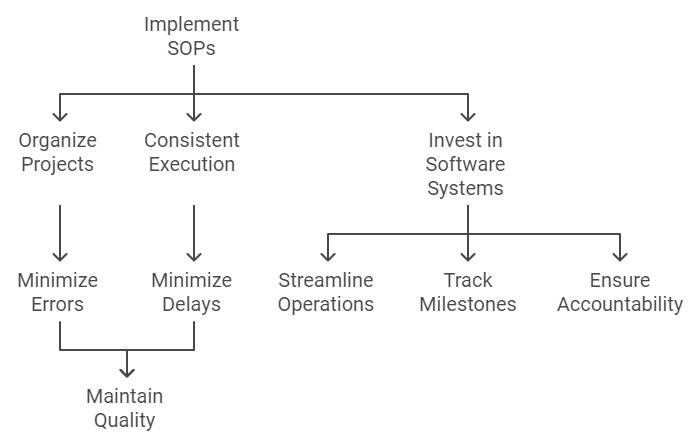
Leading solar installers utilize SOPs to ensure that every aspect of the project is well-organized and consistently executed.
This approach minimizes errors and delays while maintaining a high level of quality across all projects. In addition, these companies invest in software systems that integrate with their SOPs to further streamline operations, track project milestones, and ensure accountability.
Process Automation and Technology:
The integration of technology plays a critical role in managing and scaling operations. Solar companies with strong project management systems use software specifically designed to streamline workflows and improve efficiency.
Several software solutions are widely used in the solar industry to automate project management, service tracking, and team collaboration. Scoop, Jobflow, and Sunbase are just a few examples of platforms that help solar companies manage their operations more effectively.
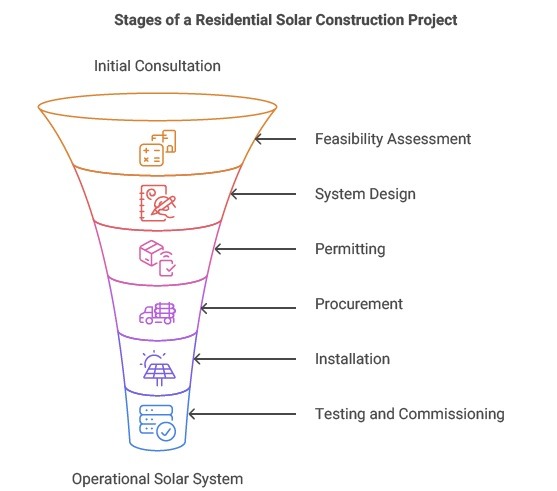
These tools allow solar installers to automate scheduling, track project progress, monitor service requests, and communicate seamlessly with field teams. For instance, Scoop offers a customizable project management platform tailored specifically to solar companies, while Jobflow provides workflow automation for service teams, and Sunbase focuses on managing solar installation projects end-to-end. By utilizing such software, companies can drive down operational costs, minimize errors, and improve both the customer and employee experience.
Staff Competency and Specialized Teams
Another key component of successful project management is the deployment of highly skilled teams that can execute installations efficiently while maintaining high standards of quality and safety.
The solar industry has, at times, struggled with the workforce with the right level of expertise, processes, and competency, making it critical for companies to build and train specialized teams.
- High-Quality Install Crews: By focusing on creating well-trained installation crews, solar companies can minimize costly mistakes, reduce the need for rework, and ensure customer satisfaction. Leading companies prioritize safety and quality in their installations, which not only improves operational performance but also enhances the company’s reputation and customer referral rates.
- Operational Training and Continuous Improvement: Continuous improvement through employee training is a hallmark of efficient project management. By offering ongoing education and certifications for installers, companies can ensure their teams stay updated on the latest technologies and industry standards, further reducing risks and inefficiencies.
- Fleet Monitoring and Service Optimization: Utilizing fleet monitoring software, such as Solar Insure, can significantly improve the customer experience by ensuring service work is tracked, performed efficiently, and completed promptly. By monitoring fleet activities, companies can optimize planning, track performance, and ensure that service visits are handled quickly and effectively. Not only does this improve customer satisfaction, but it also helps ensure that installers get paid for service work on time, especially when it comes to warranty claims or ongoing maintenance contracts. This level of operational insight reduces downtime, improves communication with customers, and streamlines billing processes for service work.
Scalability and Expansion in Solar
Scaling solar operations requires more than just adding headcount; it involves refining and replicating efficient processes at scale. Leading solar companies have successfully scaled by employing technology and infrastructure that supports operations without sacrificing quality or increasing costs.
- Efficient Logistics and Fleet Management: As companies scale, managing logistics becomes increasingly important. Leading installers operate large fleets of trucks, which are managed using software to optimize routes, reduce travel time, and ensure efficient resource utilization.
This level of logistics management allows companies to maintain lower operational costs while delivering timely installations.
- Communication and Customer Engagement
Clear, consistent communication with customers is essential for maintaining high satisfaction levels and reducing project delays. Companies that excel in project management implement automated communication systems to keep customers informed about project timelines, installation progress, and any changes that might occur. - Customer-Centric Communication: Regular updates via email or mobile apps ensure that homeowners are never left in the dark regarding their installation process. This proactive communication builds trust and reduces customer anxiety, resulting in a smoother installation process and higher customer satisfaction.
- Underpromise and Overdeliver: High-performing solar companies adopt a customer-first approach by setting realistic expectations and delivering beyond what was promised. This strategy not only ensures high-quality installations but also generates positive customer feedback and referrals, which are critical for growth.
Standardized Workflows and Quality Control
Documenting workflows and adhering to them through standardized processes is essential for maintaining consistency across all installations. Solar companies that prioritize quality control implement comprehensive QA/QC (Quality Assurance/Quality Control) procedures throughout the project lifecycle, from initial site assessments to system testing and commissioning.
Continuous Improvement and Feedback Loops: After each project, top solar companies gather feedback from their teams and customers to identify areas for improvement. This commitment to continuous improvement helps companies refine their processes and maintain high-quality standards as they grow.
Benefits of Effective Project Management
Solar installers who excel in project management experience numerous benefits:
- Higher Customer Satisfaction: By delivering high-quality installations on time and maintaining clear communication with customers, companies can increase customer satisfaction and boost referral rates.
- Improved Profitability: Efficient use of resources and adherence to standardized processes help companies control costs and improve profit margins.
- Operational Scalability: Well-defined workflows, supported by technology, enable companies to scale operations nationally while maintaining high-quality standards.
- Reduced Risk: A proactive approach to risk management, including contingency planning and quality control, reduces the likelihood of project delays, cost overruns, or customer dissatisfaction.
- Enhanced Team Productivity: Clear expectations, efficient workflows, and continuous training lead to more productive teams and better overall performance.
Service Excellence
Service excellence is a key differentiator for high-performing solar companies. Providing exceptional service not only leads to satisfied customers but also drives business growth through referrals. While many companies focus on closing sales, the real opportunity for long-term growth lies in delivering a superior customer experience throughout the lifecycle of a solar installation.
In today’s highly competitive solar market, companies must prioritize creating the best possible customer experience by educating prospects, setting clear expectations, and consistently delivering on promises. Satisfied customers are more likely to refer new business, and these referrals are valuable due to their low cost of acquisition and high levels of trust.
Why Service Excellence Matters in Solar
The journey to going solar often involves months of planning and decision-making, and for most homeowners, it’s a first-time endeavor.
This makes communication and transparency critical. Customers need to feel confident in their decision, and that confidence is built through honest, proactive communication and by providing a seamless, low-friction experience. Companies can foster trust and satisfaction by ensuring that customers understand how the process works and keeping them informed at every step.
Creating a great customer experience goes beyond the installation; it continues with post-installation service. Solar energy systems are long-term investments, often lasting 20-30 years. While modern systems are typically low-maintenance, things can still go wrong, and when they do, timely and effective service is critical to maintaining customer satisfaction.
The ability to promptly address system issues and provide ongoing support helps ensure customers feel confident in their investment, leading to positive reviews and more referrals.
Great Service Pays
“Service excellence isn’t just about keeping customers happy—it can also be a profitable business line. Solar companies can turn service calls into recurring revenue streams by partnering with warranty providers such as Solar Insure. Warranty-backed service plans provide installers with a predictable cash flow, while customers benefit from peace of mind knowing their system is covered,” says Chris.
In contrast, third-party ownership (TPO) models can create significant delays in receiving payment for service work.
By prioritizing customer ownership models, installers not only maintain more control over service timelines but also get paid more promptly, reducing financial risk. Customers who own their systems are more likely to value long-term maintenance, making them reliable clients for service contracts and warranty work.
The Power of Customer Experience
Delivering excellent service is about more than just fixing problems when they arise—it’s about fostering a strong, long-term relationship with the customer. Communication is at the heart of this. Solar companies that prioritize open, consistent communication throughout the sales and installation process, as well as after the system is live, build trust and satisfaction.
According to the Harvard Business Review, Customers who feel informed and valued are more likely to refer their friends, family, and neighbors, helping companies grow through word-of-mouth referrals.
Setting clear expectations is also critical. Customers want to know what to expect during the installation process, how their system will perform, and what they can do if something goes wrong. By being upfront and transparent about potential challenges and timelines, solar companies can avoid disappointment and build a reputation for reliability.
Point-of-Sale Verification and Welcome Calls
One effective way to enhance service excellence is by incorporating point-of-sale “welcome calls”. These calls are recorded conversations between the customer and the installer (or a third-party service) shortly after the sale, where the customer is asked specific questions about the promises made by the sales rep. These calls help ensure that the sales process is transparent and aligned with what is explicitly stated in the Home Improvement Contract (HIC). By confirming the customer’s understanding of the system, its performance, and financing details, these calls mitigate the risk of miscommunication and reduce potential disputes.
Welcome calls can be handled internally if the installer has the appropriate staff to conduct them, or they can be outsourced to a third-party service that specializes in customer follow-up and quality control. Some companies are even automating this process via webforms or recorded videos, and others are experimenting with AI-driven solutions to streamline verification and improve scalability. These technologies ensure that all promises made during the sales process are accurately captured and reflected in the contract, building trust and minimizing customer dissatisfaction down the line.
Implementation for Service Excellence
- Proactive Communication: Always keep the lines of communication open with customers. Whether it’s answering questions during the sales process or providing regular updates throughout installation, proactive communication sets the stage for a smooth experience.
- Set Clear Expectations: From the initial sales pitch to the final installation, setting realistic expectations is essential. Be honest about the timeline, the performance of the system, and any potential challenges that could arise. This helps avoid misunderstandings and ensures that customers know what to expect.
- Tailored Service Plans: Offering customized service plans or warranties like Solar Insure adds value to the customer relationship and can generate additional revenue. Post-installation support ensures that any issues are addressed promptly, reducing downtime and maintaining the customer’s trust in your company.
- Post-Installation Support: Even after the installation is complete, your relationship with the customer continues. Be sure to educate them on how to monitor system performance and what their warranty covers. When issues arise, responding quickly to service requests is essential for maintaining customer satisfaction.
Benefits of Service Excellence
- Higher Customer Retention: Customers who are satisfied with their service are more likely to return for future work, whether it’s for system upgrades, additional installations, or ongoing maintenance.
- Increased Referrals: A great customer experience leads to word-of-mouth referrals, which have a lower cost of acquisition and a higher conversion rate. Satisfied customers become brand advocates, helping to bring in new business.
- Reduced Risk of Negative Reviews: Providing exceptional service helps avoid negative online reviews that could damage your company’s reputation. When customers feel heard and supported, they are less likely to voice complaints publicly.
- Additional Revenue Streams: Service contracts, extended warranties, and proactive maintenance plans create recurring revenue opportunities that improve cash flow and reduce reliance on new installations for profitability.
Warranty Reserves and Financial De-Risking
Financial Preparedness
Warranty reserves are a critical component of financial risk management for solar installers. These reserves ensure that companies are prepared to cover future costs associated with warranty claims, which can arise from equipment defects, installation errors, or system performance issues.
Accurately estimating and setting aside funds for these potential liabilities is essential for maintaining financial stability and ensuring long-term profitability.
In the solar industry, where systems are expected to last 20-30 years, the potential for warranty claims extends over a long period. Companies must carefully analyze historical data on defect rates, repair costs, and system reliability to make accurate predictions about future warranty expenses. This ensures that warranty reserves are sufficient to cover claims without straining cash flow or profitability.
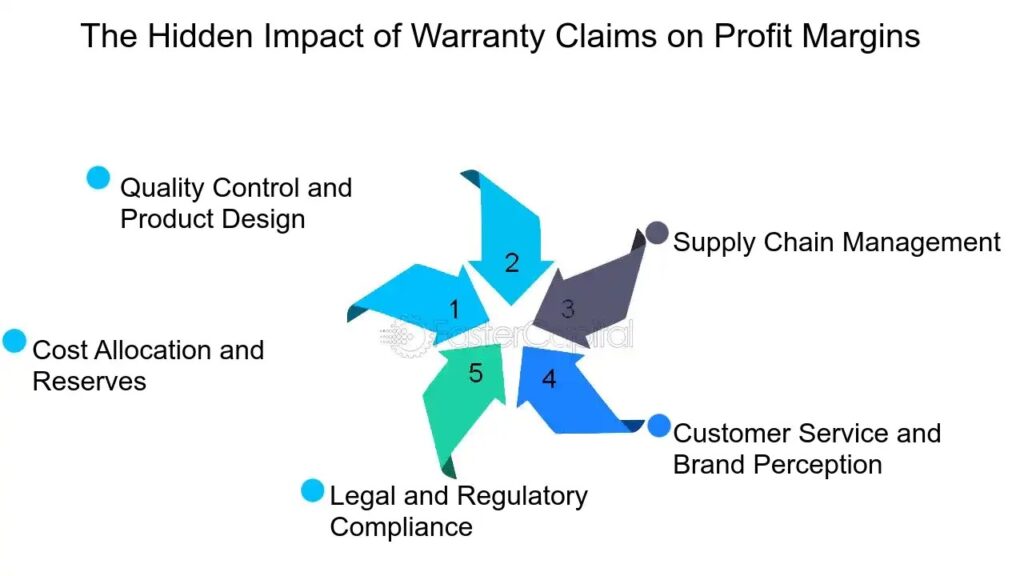
The Importance of Accurate Warranty Reserves
Accurate warranty reserve estimation is not just a best practice—it is a requirement under financial accounting standards such as those mandated by the Financial Accounting Standards Board (FASB). These reserves must be reflected on a company’s balance sheet, ensuring that liabilities are aligned with revenue and expenses in the same reporting period.
Failure to account properly for warranty reserves can lead to significant financial misstatements.
Overestimating reserves may unnecessarily reduce reported profits, while underestimating them can result in large, unexpected expenses that affect future financial performance. Both scenarios can impact investor confidence, access to capital, and the overall financial health of a solar company.
Recognizing and Adjusting Warranty Reserves
Warranty reserves are typically calculated based on historical data, including defect rates, repair costs, and the likelihood of future claims. For example, if a company has a defect rate of 5% and generates $1,000,000 in sales, it would set aside $50,000 in warranty reserves to cover potential future claims. These reserves are recognized as a liability on the balance sheet and adjusted as actual claims are made.
Adjustments to warranty reserves are essential to maintain accuracy. If actual claims exceed the initial estimates, the reserve must be increased, and additional expenses will be recognized.
Conversely, if claims are lower than expected, the excess reserve can be released, boosting profitability. This dynamic management of warranty reserves ensures that companies can respond to changing conditions and maintain financial flexibility.
Impact on Profitability and Financial Reporting
The recognition of warranty expenses can have a significant impact on a company’s profitability. Warranty costs are recorded as expenses in the same period as the revenue from the related sales, which aligns with the matching principle of accounting.
For example, if a company expects that 2% of its sold systems will incur warranty costs and sets aside reserves accordingly, these expenses will be recognized upfront, reducing net income in the short term.
This proactive approach to warranty accounting helps solar companies avoid unexpected financial shocks and provides a more accurate picture of long-term profitability. However, it also requires companies to carefully monitor their reserves and adjust them based on real-world data, ensuring that they accurately reflect future obligations.
Managing Warranty Liabilities on the Balance Sheet
Warranty liabilities represent a company’s obligation to repair or replace systems under warranty. These liabilities are typically classified as current liabilities (if the warranty period is one year or less) or long-term liabilities (for warranties extending beyond one year). Solar companies must exercise judgment in setting aside sufficient reserves to cover these liabilities, using historical data and industry standards to guide their estimates.
The impact of warranty liabilities on a company’s financial health can be significant. Properly managed warranty reserves ensure that the company is prepared for future claims, reducing the risk of cash flow issues and maintaining investor confidence. Conversely, inadequate reserves can lead to financial strain, especially if a wave of warranty claims materializes unexpectedly.
Risk Mitigation Through Warranty Products
One way solar companies can reduce financial risks associated with warranties is by partnering with third-party warranty providers like Solar Insure. By transferring some of the long-term liability to these providers, companies can de-risk their balance sheets and focus on growing their core business.
Warranties also offer peace of mind to customers, who know that their systems are backed by both the installer and the warranty provider. This dual layer of protection increases consumer confidence and can make solar installations more attractive to potential customers.
Strategies for Building Warranty Reserves
Solar companies can implement several strategies to build and manage their warranty reserves effectively:
- Accurate Estimation: Use historical data to estimate defect rates, repair costs, and claim frequencies. This helps ensure that reserves are neither too high nor too low.
- Regular Adjustments: Continuously monitor warranty claims and adjust reserves accordingly. This dynamic approach ensures that reserves reflect real-world conditions and minimize financial surprises.
- Partner with Warranty Providers: By outsourcing some of the warranty risk to third-party providers like Solar Insure, companies can reduce their financial exposure while still offering comprehensive warranty coverage to customers.
Impact on Business Value
Robust warranty reserve management has a direct impact on a company’s financial health and overall valuation. Investors and financial institutions look for well-managed companies that have planned for future obligations, as this reduces the risk of financial instability. By maintaining adequate reserves, companies can improve their creditworthiness and access to growth capital.
A strong balance sheet, supported by accurate warranty reserves and de-risking strategies, also positions solar companies to weather economic downturns and industry challenges. This financial stability is a key differentiator in a competitive market, enabling companies to scale sustainably and with confidence.
Conclusion
In today’s competitive solar market, adopting best practices like vertical integration, customer ownership models, service excellence, and effective project management can set installers apart.
By adopting these best practices, solar companies can experience transformative results:
- Operational Improvements: Vertical integration and effective project management streamline operations, improving efficiency and control over the entire customer journey.
- Financial Benefits: Better sales close rates, improved cash flow through service plans, and stable warranty reserves contribute to long-term profitability.
- Customer Satisfaction: Companies that deliver exceptional service and focus on ownership models generate more referrals and foster stronger relationships with clients.
- Market Position: Differentiating through quality, ownership models, and financial resilience allows companies to build stronger brands and attract more business.
- Risk Reduction: Effective warranty reserves, service excellence, and integrated sales reduce financial and operational risks for solar installers.
By improving operations, increasing customer satisfaction, and managing financial risks, solar companies position themselves for long-term success. The future belongs to those who are willing to invest in excellence and continuous improvement.
Discover more from Solar Insure:


